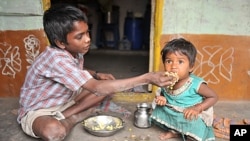India's prime minister says malnutrition is a national shame, as a new survey finds that 42 percent of India's children are underweight. India has long ranked low on the global hunger index but, an alliance of lawmakers, eminent citizens and voluntary groups hopes to change that.
Prime Minister Manmohan Singh said in New Delhi Tuesday that levels of hunger remain too high in India despite impressive economic growth.
He was releasing the Hunger and Malnutrition Survey, which underlines widespread malnutrition in the country.
“What concerns me and what must concern all enlightened citizens is that 42 percent of our children are still underweight," Singh said. "This is an unacceptably high occurrence, and I repeat, the problem of malnutrition is a matter of national shame.”
The survey was prepared by the non-profit Naandi Foundation for the Citizens Alliance against Malnutrition. The alliance brings together volunteer groups, young lawmakers from various parties, and prominent citizens who want to turn the spotlight on a problem which many say is not getting the attention it deserves.
The prime minister said the new survey is both “worrying and encouraging.” It shows a drop in the prevalence of malnutrition. But the decline is slow - less than three percent a year over the last seven years.
The survey says many children in India are born underweight. Others become stunted by the age of two. But most mothers are unaware of what afflicts their children - more than 90 percent of those covered by the survey had not heard of the word malnutrition.
Some of these findings are not new. India ranked 67 among 84 countries on the 2010 Global Hunger Index, behind many sub-Saharan countries.
What is new is the initiative by those who conducted the latest study. One young lawmaker, B.J. Panda, says the survey has identified “what works and what does not work.”
“We found that when mid-day meals are done by local NGO’s [non-governmental groups] or even more importantly by women self-help groups where children of the women who provide the mid-day meal are actually in that group, then you find a greater degree of efficacy than a government department running it,” Panda noted.
Such findings will be used to initiate more efficient programs to mitigate hunger at a faster pace in three districts in the states of Rajasthan, Madhya Pradesh and Orissa. If successful, the model will be replicated in other states.
Indian policy makers admit that access to food remains a challenge for vast sections of the population despite several government programs which include the world’s largest free, school-meal program.
The high levels of hunger have prompted the government to introduce an ambitious Food Security Bill which promises cheaper food grains to two-thirds of the country’s 1.2 billion people.
Prime Minister Singh says the new survey underlines the need to pass the legislation quickly. But critics fear that it may face the same problems that afflict many other programs - a sluggish bureaucracy and corruption.




